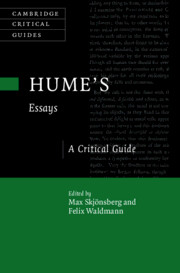Book contents
- Hume’s Essays
- Cambridge Critical Guides
- Hume’s Essays
- Copyright page
- Dedication
- Contents
- Figures
- Contributors
- Acknowledgements
- Abbreviations
- Introduction
- Part I Reception
- Part II Philosophy
- Part III Politics
- Chapter 8 Reconstructing Oceana
- Chapter 9 ‘One of the Most Difficult Problems, That Can Be Met With’
- Chapter 10 Hume on Eloquence and the Failings of English Political Oratory
- Part IV Political Economy
- Bibliography
- Index
- Cambridge Critical Guides
Chapter 9 - ‘One of the Most Difficult Problems, That Can Be Met With’
Hume on Political Parties
from Part III - Politics
Published online by Cambridge University Press: 02 January 2025
- Hume’s Essays
- Cambridge Critical Guides
- Hume’s Essays
- Copyright page
- Dedication
- Contents
- Figures
- Contributors
- Acknowledgements
- Abbreviations
- Introduction
- Part I Reception
- Part II Philosophy
- Part III Politics
- Chapter 8 Reconstructing Oceana
- Chapter 9 ‘One of the Most Difficult Problems, That Can Be Met With’
- Chapter 10 Hume on Eloquence and the Failings of English Political Oratory
- Part IV Political Economy
- Bibliography
- Index
- Cambridge Critical Guides
Summary
Few, if any, political thinkers of the eighteenth century dealt as thoroughly and extensively with the concept of political party as David Hume. This chapter considers Hume’s various essays that treated the phenomenon of party between 1741 and 1758. In his first essays on party, he showed how both the Whig-Tory and Court-Country alignments were integral to British party politics, with the former dividing the political nation along dynastic and religious lines and the latter being a natural expression of the workings of the mixed constitution and inter-parliamentary conflict. In this way, he sought to transcend the arguments of the Court Whig ministry and the Country party opposition alike. Writing a new set of essays in the wake of the Jacobite rising of 1745, Hume turned to the parties’ ideological systems, as he tried to show that neither the Whig system of the ‘original contract’ nor the Tory system of passive obedience held water if philosophically probed, but that they could both have salutary consequences. While critical, Hume continued to give a fair hearing to both parties in his final essay on the subject, ‘Of the Coalition of Parties’ (1758). Though he ultimately wrote in favour of the Glorious Revolution and the Hanoverian Succession, this chapter concludes that Hume may have approximated the ideal of non-partisanship as far as was possible in a divided society.
Keywords
- Type
- Chapter
- Information
- Hume's EssaysA Critical Guide, pp. 162 - 186Publisher: Cambridge University PressPrint publication year: 2025

